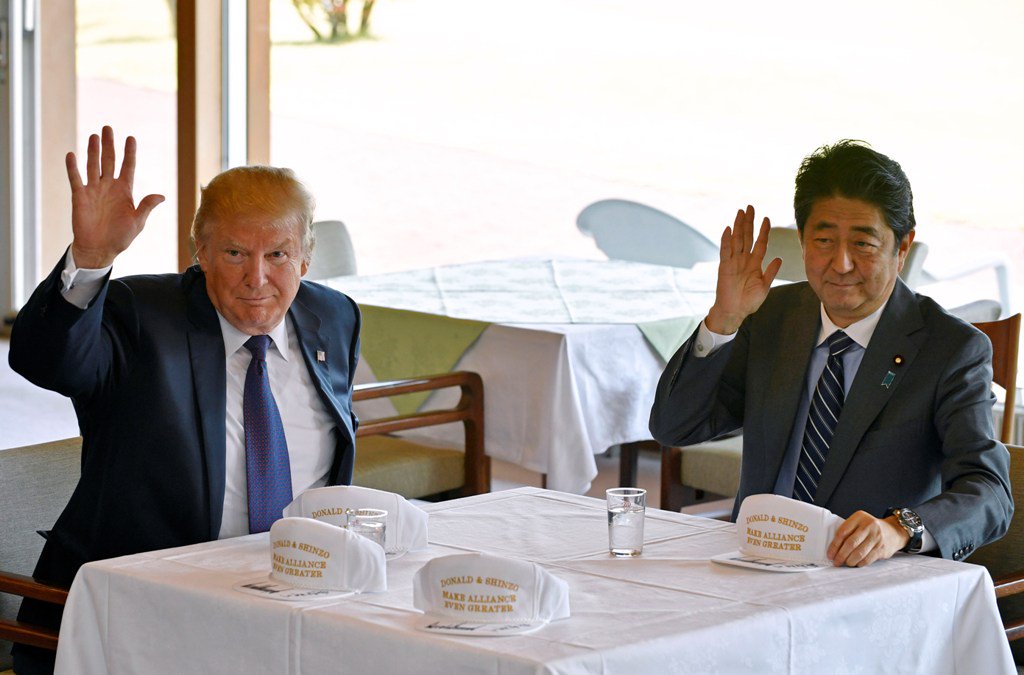- 15 Nov 2017 08:17
#14862819
Trump has been touring Asia. This hasn’t received much attention on POFO. Yet it seems the image of America in Asia is that of a power in decline.
Is America a nation in decline?
Is America a nation in decline?
The trouble with Donald Trump's Asia trip
By John Barron
Updated Tue at 2:44pm
Trump in front of a flag
PHOTO: Has selling a vision of 'America in decline' come back to bite Trump as he meets with Asia's most powerful leaders? (Reuters: Kevin Lamarque)
Donald Trump's 12-day, five-nation tour of Asia is historic. It's a quarter of a century since an American president made such a lengthy tour of the region.
In late 1991 and early 1992, president George Bush (no need for initials in those days) embarked on a victory lap following the end of the Cold War and the Gulf War, crowning America's global hegemony as the world's only super-power.
Bush had served in the region in World War II, and was greeted as an old friend in Sydney for New Year's Eve, and even by the Japanese who had shot his plane down 48 years earlier.
Those were heady days. Communist dictators had been toppling faster than Hollywood moguls accused of sexual harassment. Political scientist Francis Fukuyama would soon be writing about "The End of History" and the enduring dominance of liberal democratic and capitalist societies.
Trade barriers were coming down, Europe was uniting under a single currency, concern over the environment was growing, and the world came together at the 1992 Earth Summit leading to the Kyoto Accord.
It turns out to have been more of a turning point in history than an end point.
When dinner goes wrong
For George Bush, things started to go badly on that Asia tour. Seated at a state dinner in his honour hosted by Japanese prime minister Kiichi Miyazawa, the 67-year-old American president suddenly turned pale, vomited, and slid to the floor.
George HW Bush
PHOTO: George Bush was the last US President to tour Asia this extensively, representing an America at its peak. (Reuters)
For a few minutes, until Bush regained consciousness, the world faced the possibility of the seemingly incompetent vice-president Dan Quayle becoming the most powerful man on the planet.
Back home, Bush was facing a challenge for the Republican Party nomination by former friend and Nixon speechwriter Patrick Buchanan. Buchanan's campaign was like a prototype for the kind of campaign that swept Trump to power: economically populist and anti-immigrant, fuelled by racial and social resentment.
The Japan "incident" helped make Bush look old and hapless, and as the American economy faltered he would soon be replaced by the younger Democrat Bill Clinton - a baby-boomer who would win the White House despite a number of scandals around extra-marital affairs and dodging the draft in Vietnam.
What a golden age 1992 now seems, when a bout of flu and the prospect of someone like Quayle, who couldn't spell "potato" without adding an extra "e", was enough to damage a better than average President like Bush.
Twenty-four years after losing the presidency to Bill Clinton, George Bush would announce he had voted for Clinton's wife Hillary for the presidency over his own parties' nominee, Donald Trump.
How did Trump go?
But wait, what about Trump in Asia? What has he done wrong? Did he hurl on the Japanese PM? Did he grope a woman he was being photographed with? Old George Bush did both of those things.
U.S. President Donald Trump and Russian President Vladimir Putin
PHOTO: Trump and Putin take part in an APEC family photo in matching shirts. (Reuters: Sputnik/Mikhail Klimentyev/Kremlin)
Well, Trump didn't look great in those silly APEC shirts. Hardly a scandal, but likely to rile a man who has his ties especially tailored to hang below his waistline and disguise his girth.
He mostly stuck to his script in addresses to parliaments and various dignified occasions. He didn't even push anyone out of the way like he did at the NATO summit in Brussels in May.
Trump did send some un-presidential tweets of course. Making use of those extra 140 characters to bait North Korea's Kim Jong-Un with a schoolyard taunt, by pointing out he would NEVER call Kim "short and fat"? And bizarrely taking Putin's word over that of US intelligence when it came to Russian tampering in the Presidential election.
Now, the trouble with Trump's Asia trip isn't really Trump at all. Just as he identified an America in sharp decline during the 2016 election, the real trouble is that the world now seems to agree.
President Bush was a hero of the war that saved civilisation from Nazism and Japanese militarism, before grinding out a decades long defeat of communism.
President Trump used bone spurs to dodge the Vietnam Draft, a hedonist who erected offices, apartments and casinos bearing his name in gold letters.
He represents the excesses of Wall Street rather than the values on Main Street but sold the electoral equivalent of a get-rich scheme to unwitting voters.
The sad truth is Trump is what America has now become. And the world can see it.
Looking back through a nostalgic mist to 1992, all of the warning signs were there — when Billy Ray Cyrus topped the charts with Achy, Breaky Heart we should have known something was going horribly wrong.
US President Donald Trump boards Air Force One to depart for the Philippines.
http://www.abc.net.au/news/2017-11-14/the-trouble-with-trumps-asia-trip/9147630



















 - By Tainari88
- By Tainari88 - By Pants-of-dog
- By Pants-of-dog - By Deutschmania
- By Deutschmania